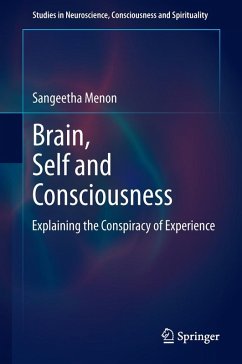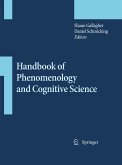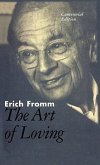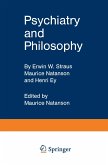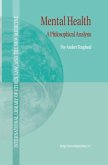This book discusses consciousness from the perspectives of neuroscience, neuropsychiatry and philosophy. It develops a novel approach in consciousness studies by charting the pathways in which the brain challenges the self and the self challenges the brain. The author argues that the central issue in brain studies is to explain the unity, continuity, and adherence of experience, whether it is sensory or mental awareness, phenomenal- or self-consciousness. To address such a unity is to understand mutual challenges that the brain and the self pose for each other. The fascinating discussions that this book presents are: How do the brain and self create the conspiracy of experience where the physicality of the brain is lost in the subjectivity of the self?
From the reviews:
"The book combines neuroscience and philosophy to get an understanding of the self and consciousness. It deals with questions such as the difference between body-sense and self-sense. ... neuroscientists, philosophers, and theologians would seem to be the obvious audience. A background in neuroscience and philosophy would be extremely helpful in getting the most out of the book." (Gary B. Kaniuk, Doody's Book Reviews, March, 2014)
Sangeetha Menon's well-documented work is underpinned by the (too often underrated) observation that a knower is presupposed by anything known, including the known brain. It is extended to a study of agency and responsibility that gives practical ground to the challenged notion of a self. By weaving the lived and the observed into a synthetic picture of the mind-brain, the author also succeeds in making sense of the task of self-transformation, which a purely reductionist stance would just deflate into neural fitness. A very clear and exhaustive presentation of a complex yet interconnected web of topics, from the cognitive neuroscience to the analytic philosophy of mind and the Upanishads.
- Michel Bitbol, Directeur de Recherche, Archives Husserl CNRS, Paris
This is an amazingly rigorous cross-disciplinary work with a strong contention about the core-self as deep, organic, inclusive and extended beyond any reductionist or even minimal fleeting self: a great challenge for both the scientific community and the philosophical world! An urgent invitation for both to mutually look closer into the lived embodied consciousness and into the brain web!
- Natalie Depraz, Professor of Philosophy, University of Rouen
[Menon has] addressed a 'blind spot' in consciousness research, the 'core self'. This was arrived at through going beyond the binary thinkingof body self and self sense. Sangeetha has presented a fascinating multi-disciplinary approach to the study of self. She penetrates deeply into the phenomenology of the body self, self sense and the core self. Most importantly, she suggests the core self to be equivalent to the space of consciousness.
- James Barrell, Professor of Psychology
and author of 'Inner Experience and Neuroscience', The MIT Press
This book is both interdisciplinary and cross-traditional, as Menon draws on the findings of neuroscience, psychology and cognitive science, the Western and Eastern approaches to philosophy of mind, phenomenology and the Vedantic tradition, all to address the crucial issue of the self. Menon's main goal is to explore the self, and the self-representation, as the key to understanding consciousness. She uncovers the ways in which the self-representation depends on the body-representation, memory, emotion, character, personality, and the essential personal commitments that give our lives meaning. Whether one approaches the self from the analytic philosophy of mind, from phenomenology, or from cognitive science, this book will provide something novel, fascinating and important. It is an impressive work of impressive breadth and depth.
- Jason Ford, Associate Professor of Philosophy,
College of Liberal Arts, University of Minnesota
"The book combines neuroscience and philosophy to get an understanding of the self and consciousness. It deals with questions such as the difference between body-sense and self-sense. ... neuroscientists, philosophers, and theologians would seem to be the obvious audience. A background in neuroscience and philosophy would be extremely helpful in getting the most out of the book." (Gary B. Kaniuk, Doody's Book Reviews, March, 2014)
Sangeetha Menon's well-documented work is underpinned by the (too often underrated) observation that a knower is presupposed by anything known, including the known brain. It is extended to a study of agency and responsibility that gives practical ground to the challenged notion of a self. By weaving the lived and the observed into a synthetic picture of the mind-brain, the author also succeeds in making sense of the task of self-transformation, which a purely reductionist stance would just deflate into neural fitness. A very clear and exhaustive presentation of a complex yet interconnected web of topics, from the cognitive neuroscience to the analytic philosophy of mind and the Upanishads.
- Michel Bitbol, Directeur de Recherche, Archives Husserl CNRS, Paris
This is an amazingly rigorous cross-disciplinary work with a strong contention about the core-self as deep, organic, inclusive and extended beyond any reductionist or even minimal fleeting self: a great challenge for both the scientific community and the philosophical world! An urgent invitation for both to mutually look closer into the lived embodied consciousness and into the brain web!
- Natalie Depraz, Professor of Philosophy, University of Rouen
[Menon has] addressed a 'blind spot' in consciousness research, the 'core self'. This was arrived at through going beyond the binary thinkingof body self and self sense. Sangeetha has presented a fascinating multi-disciplinary approach to the study of self. She penetrates deeply into the phenomenology of the body self, self sense and the core self. Most importantly, she suggests the core self to be equivalent to the space of consciousness.
- James Barrell, Professor of Psychology
and author of 'Inner Experience and Neuroscience', The MIT Press
This book is both interdisciplinary and cross-traditional, as Menon draws on the findings of neuroscience, psychology and cognitive science, the Western and Eastern approaches to philosophy of mind, phenomenology and the Vedantic tradition, all to address the crucial issue of the self. Menon's main goal is to explore the self, and the self-representation, as the key to understanding consciousness. She uncovers the ways in which the self-representation depends on the body-representation, memory, emotion, character, personality, and the essential personal commitments that give our lives meaning. Whether one approaches the self from the analytic philosophy of mind, from phenomenology, or from cognitive science, this book will provide something novel, fascinating and important. It is an impressive work of impressive breadth and depth.
- Jason Ford, Associate Professor of Philosophy,
College of Liberal Arts, University of Minnesota

